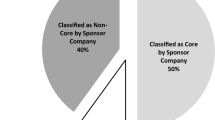Abstract
The Clinical Data Interchange Standards Consortium (CDISC) has developed standards for data models, study design, and supporting clinical trial documents. CDISC standards have made such gains that the Center for Drug Evaluation and Research strongly encourages their use and implementation for submission of drug applications. However, despite the advances and improvements in these standards over the years and the ever-looming threat that they may someday be a requirement for drug applications, many are skeptical of a single standard and fail to understand the far-reaching advantages of adopting it. In this article we address the concerns and present numerous tangible benefits of CDISC standards.
Similar content being viewed by others
References
CDISC Submission Data Standards Team. Study Data Tabulation Model, Version 1.2. Round Rock, TX: Clinical Data Interchange Standards Consortium; 2008.
CDISC Submission Data Standards Team. Study Data Tabulation Model Implementation Guide: Human Clinical Trials, Version 3.1.2. Round Rock, TX: Clinical Data Interchange Standards Consortium; 2008.
CDISC Analysis Data Model Team. Analysis Data Model (ADaM), Version 2.1. Round Rock, TX: Clinical Data Interchange Standards Consortium; 2009.
CDISC Analysis Data Model Team. Analysis Data Model (ADaM) Implementation Guide, Version 1.0. Round Rock, TX: Clinical Data Interchange Standards Consortium; 2009.
CDISC Standard for Exchange of Nonclinical Data Team. Standard for Exchange of Nonclinical Data Implementation Guide: Nonclinical Studies, Version 3.0. Round Rock, TX: Clinical Data Interchange Standards Consortium; 2011.
Wood F, Guinter T. Evolution and implementation of the CDISC study data tabulation model (SDTM). Pharm Programming. 2008;1(1):20–27.
Rozwell C, Kush R, Helton E. CDISC standards: enabling reuse without rework. Appl Clin Trials. 2006;15:76–78.
Rozwell C, Kush R, Helton E. Saving time and money. Appl Clin Trials. 2007;16:70–74.
CDISC Submission Data Standards Team. Amendment 1 to the Study Data Tabulation Model (SDTM) v1.2 and the SDTM Implementation Guide: Human Clinical Trials V3.1.2. Round Rock, TX: Clinical Data Interchange Standards Consortium; 2011.
Center for Drug Evaluation and Research. CDER Common Data Standards Issues Document, Version 1.0. 2011. https://doi.org/www.fda.gov/Drugs/DevelopmentApprovalProcess/FormsSubmissionRequirements/ElectronicSubmissions/ucm248635.htm
Haley EC, Kassell NF, Torner JC. A randomized controlled trial of high-dose intravenous nicardipine in aneurysmal subarachnoid hemorrhage. J Neurosurg. 1993;78:537–547.
Author information
Authors and Affiliations
Corresponding author
Rights and permissions
About this article
Cite this article
Zink, R.C., Mann, G. On the Importance of a Single Data Standard. Ther Innov Regul Sci 46, 362–367 (2012). https://doi.org/10.1177/0092861512441101
Received:
Accepted:
Published:
Issue Date:
DOI: https://doi.org/10.1177/0092861512441101



